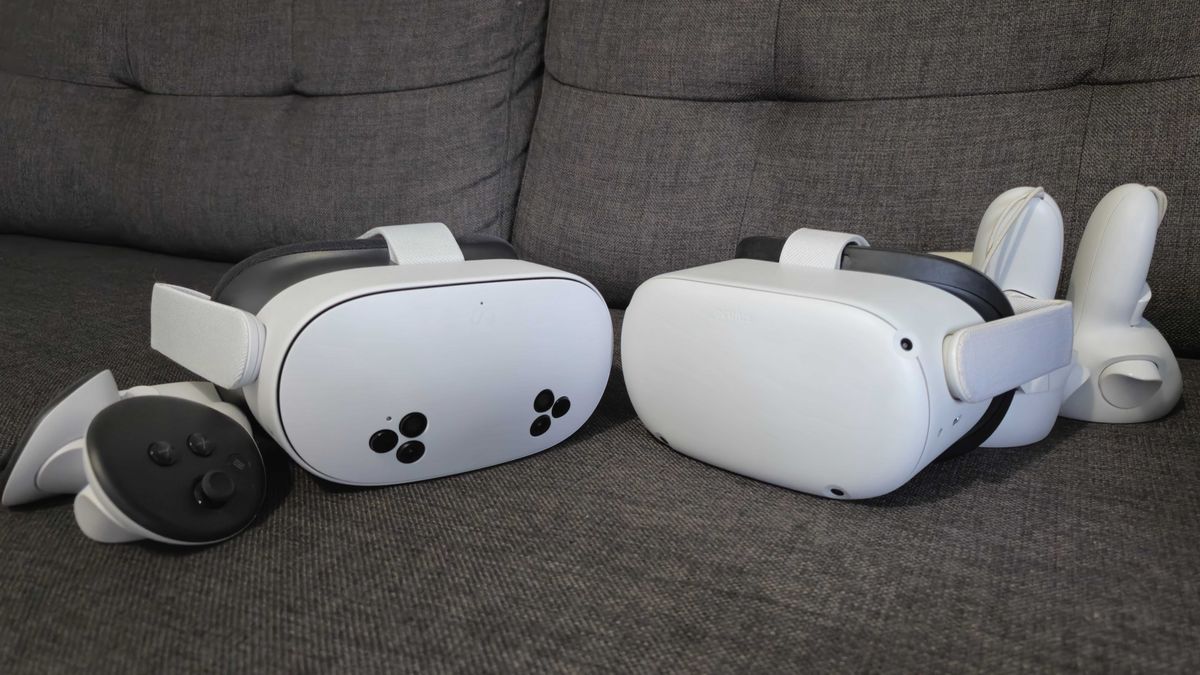I finally got my hands on the Meta Quest 3S VR headset to test it out for our in-depth Meta Quest 3S review, and using the headset has given me flashbacks of using the Oculus Quest 2 – and made me realize how rubbish its visuals were this whole time.
The Meta Quest 3S uses the same chipset and has the same RAM as the Meta Quest 3, meaning it can play all the same VR games and apps as its sibling like the upcoming Batman: Arkham Shadow (it even comes with a free copy of the game). But its most noticeable downgrade is its displays. Instead of the crisp 2064 x 2208 pixels per eye dual-display setup of the Quest 3 you have to make do with the Quest 2’s 1832 x 1920 per eye single display setup, which the Quest 3S is repurposing.
The Meta Quest 3S also relies on the Quest 2’s fresnel lens system instead of the pancake lenses used by the Quest 3. I won’t get into the weeds of how these lenses differ technically, but know that fresnel lenses are bulkier and cause blurriness at the fringes of your field of view.
The Quest 3 is worth upgrading to
Back when I was regularly using my Oculus Quest 2 – which was later rebranded as a Meta Quest 2 – I definitely noticed that the visuals weren’t as crisp as watching a show on my phone or playing a game with my PS5 on a 4K TV. But I’d also often feel that people who were overly critical of the resolution or screen door effect were being too harsh (the screen door effect is when you see black lines over the display because you can see the gaps between pixels).
I had a fantastic time using it and felt (and still feel) it was hands-down the best VR headset for most people at its peak thanks to its solid performance for its super-low price.
But back then the Oculus Quest 2 was my baseline for VR headsets; I had never used another headset before – save for the odd demo at a gaming convention or university fair. Now that my baseline is the superior Meta Quest 3 I finally understand everyone’s Quest 2 visuals criticisms.
That’s not to say the Meta Quest 3S isn’t an excellent VR headset for the price. Starting at $299.99 / £289.99 / AU$499.99 for the 128GB model and achieving what the Meta Quest 3S achieves is nothing to sniff at. If you’re new to VR and haven’t yet been spoiled by better VR headsets, then its issues won’t be as noticeable or annoying.
However, when weighing up your options between the two Meta Quest 3 headsets, remember it’s not just a matter of picking your preferred storage size as there are some significant other differences to consider.
Top-quality visuals won’t matter to everyone, and when you’re immersed in an interactive experience the Quest 3S’ deficiencies aren’t as noticeable. Just note that if you plan to be a VR power user that hops in a couple times a week at least, and who wants to enjoy Netflix or Xbox game streaming in VR or MR, then the sharper Meta Quest 3 is the headset you should get.
So if you can still find the 128GB Meta Quest 3 before it sells out try to grab it before the discontinued model is gone for good and you have to make do with the pricier 512GB model instead.






